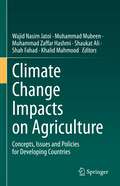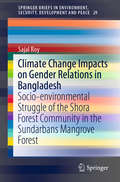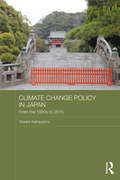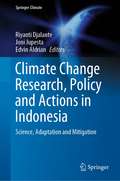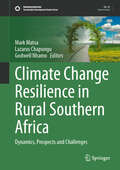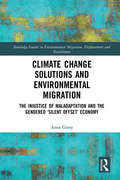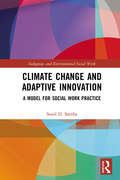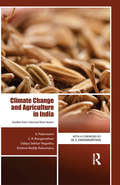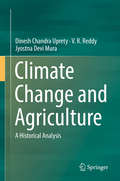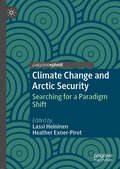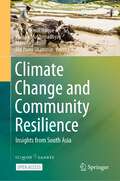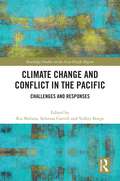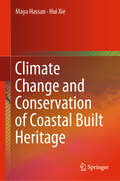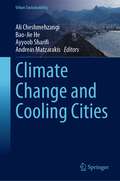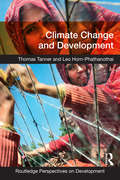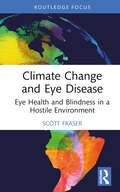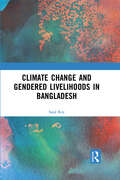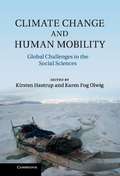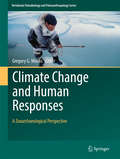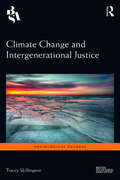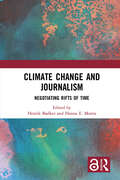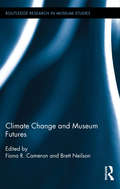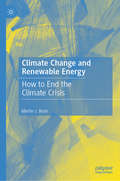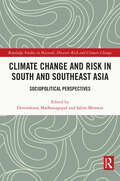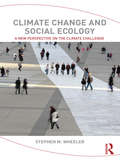- Table View
- List View
Climate Change Impacts on Agriculture: Concepts, Issues and Policies for Developing Countries
by Muhammad Zaffar Hashmi Khalid Mahmood Shah Fahad Wajid Nasim Jatoi Muhammad Mubeen Shaukat AliThis book offers perspective on climate change impacts on developing nations from scholars within those nations, primarily focusing on agriculture. Throughout three parts containing a total of over twenty chapters from scholars in developing countries, it aims to offer guidelines for researchers, policymakers, and farmers themselves on how developing countries can achieve sustainable food security and continue development on a sustainable basis.Part I covers climate change concepts and issues for developing countries; Part II offers chapters dealing with social issues surrounding climate change and agriculture; Part III addresses practical policies that can be implemented to work toward achieving the goals described above. Agriculture is a key sector in developing countries in terms of economic growth and social well-being. Adapting and building resilience to climate change means increasing agricultural productivity and incomes and reducing greenhouse gases emissions. This volume represents an effort toward collecting knowledge on the technical, policy and investment measures to achieve sustainable agricultural growth in the sectors of grain, fruit, vegetable, fiber, feed, livestock, fisheries and forest under climate change in one place.
Climate Change Impacts on Gender Relations in Bangladesh: Socio-environmental Struggle of the Shora Forest Community in the Sundarbans Mangrove Forest (SpringerBriefs in Environment, Security, Development and Peace #29)
by Sajal RoyThis book explores gendered perceptions of the Sundarbans Forest in Bangladesh, and the extent to which these perceptions are affected by extreme weather events (specifically, cyclones Aila and Sidr). Based on ethnographic fieldwork in Shora, a rural village in southern Satkhira, Bangladesh, the book explores gendered activities in the forest, especially women’s interaction with the forest resources. The findings present a clear picture of the Shora community’s local knowledge about the Sundarbans Forest, as well as the ecological and economic contributions for the forest people. The book makes a timely contribution to the wider study of gender, post-cyclone recovery, ecology and resilience.
Climate Change Policy in Japan: From the 1980s to 2015 (Routledge Studies in Asia and the Environment)
by Yasuko KameyamaAmidst growing environmental concerns worldwide, Japan is seen as particularly vulnerable to the effects of changing climate. This book considers Japan’s response to the climate change problem from the late 1980s up to the present day, assessing how the Japanese government’s policy-making process has developed over time. From the early days of climate change policy in Japan, through the United Nations Framework Convention on Climate Change conferences and Kyoto Protocol, right up to the 2015 negotiations, the book examines the environmental, economic, and political factors that have shaped policy. As the 2015 Conference of the Parties to the United Nations Framework Convention on Climate Change projects forward beyond 2020, the book concludes by analyzing how Japan has placed itself in the global climate change debate and how the country might and should respond to the problem in the future, based on the findings from accumulated history.
Climate Change Research, Policy and Actions in Indonesia: Science, Adaptation and Mitigation (Springer Climate)
by Joni Jupesta Riyanti Djalante Edvin AldrianThis edited volume reviews the latest advances in policies and actions in understanding the science, impacts and management of climate change in Indonesia. Indonesia is one of the most vulnerable countries to climate change due to its geographical, physical, and social-economic situations. There are many initiatives to understand and deal with the impacts in the country. The national government has issued key guiding policies for climate change. International agencies together with local stakeholders are working on strengthening the capacity in the policy formulations and implement actions to build community resilience. Universities are conducting research on climate change related at different scales. Cities and local governments are implementing innovations in adapting to the impacts of climate change and transiting toward green economy. This book summarizes and discusses the state-of-the-art regarding climate change in Indonesia including adaptation and mitigation measures. The primary readership of the book includes policy makers, scientists and practitioners of climate change actions in Indonesia and other countries facing similar challenges.
Climate Change Resilience in Rural Southern Africa: Dynamics, Prospects and Challenges (Sustainable Development Goals Series)
by Godwell Nhamo Mark Matsa Lazarus ChapunguIn rural Southern Africa, the livelihoods of millions are intricately linked to the land, water, and ecosystems that are increasingly under threat from climate change. This intensifying threat has exacerbated pre-existing vulnerabilities, rendering the need for resilience building more critical than ever. Emerging scholarship on climate change strategies suggest that building resilience in human and environmental systems is the ideal strategy for combating the climate change induced catastrophes. Rural Southern Africa has witnessed both isolated and coordinated efforts by various stakeholders to bolster climate resilience, yielding varying degrees of success. This book offers a comprehensive examination of the rural Southern African landscape, probing the intricate dynamics, prospects, and challenges associated with building climate resilience. It examines how traditional knowledge, innovative practices (including Artificial Intelligence), and sustainable development strategies are converging to create resilient systems. The book further highlights the critical role of local communities in addressing climate challenges and offers actionable insights for a more resilient future. It emerged that some interventions have managed to build resilience of at-risk households, communities and systems, while others have faced significant challenges. In general, climate resilience building remains complex and lagging due to increased vulnerabilities induced by global disease emergencies such as COVID-19, increased poverty due to global recessions, poor governance, corruption and several other internal and external factors. Therefore, the need to increase cooperation amongst Southern African states to pursue common development goals cannot be overemphasized. Rich with case studies, expert analyses, and systematic reviews, this book is an essential read for policymakers, researchers, and those invested in the future of rural Southern Africa.
Climate Change Solutions and Environmental Migration: The Injustice of Maladaptation and the Gendered 'Silent Offset' Economy (Routledge Studies in Environmental Migration, Displacement and Resettlement)
by Anna GintyThis book lifts the taboo on maladaptation, a different driver of environmentally induced migration, which shines a light on the negative consequences arising from the solutions to climate change, adaptation and mitigation policies. Through a systematic analysis and critique of existing mitigation and adaptation polices under the United Nations Framework Convention on Climate Change (UNFCCC) and international development community, and supplemented by a small empirical study in Indonesia, this book catalogues how maladaptation is manufactured under existing climate change solutions. It posits that customary communities in general- and women in particular- are disproportionately affected by the dominant market-driven logics that underscore current climate change solutions adopted by the UNFCCC. The injustice of maladaptation is highlighted as multi-faceted and explored using political, economic, social and ecological lenses, and the concept of environmental reintegration is also explored as a possible solution to this issue. Further possibilities are then presented in the Afterword, as a combination of what the new (post-neoliberalism) conjuncture could potentially look like. This volume will be of great interest to students, scholars and practitioners of climate change, environmental policy, environmental migration and displacement, development studies, I/NGOs and civil society actors and activists more broadly.
Climate Change and Adaptive Innovation: A Model for Social Work Practice (Indigenous and Environmental Social Work)
by Sunil D. SanthaThe world is witnessing climate change. As responsible citizens of planet earth, we can actively participate in the co-creation of actionable knowledge and solutions. There may not be a single and linear pathway to adaptation anymore. This book explores multiple and iterative pathways of adapting to climate change and its impacts. Climate Change and Adaptive Innovation introduces an adaptive innovation model that has its premise on core values of justice, care and solidarity. Navigating collectively through shared conversations and dialogic processes, this model showcases how we could embark on an enduring journey where diverse actors could collaboratively make informed choices and take necessary actions to enhance the safety and security of their lived environment. Rooted in action research, it is envisaged that this model could enable us to facilitate the designing and implementation of people-centred ethical adaptation projects. This book will be of interest to social workers, social scientists and development practitioners who are engaged in the field of climate justice, adaptation, social innovation and sustainable livelihoods. Social work educators and students will certainly draw inspiration from the stories that are shared in this book. It will further motivate many transdisciplinary professionals to engage with action research as a method of innovation, reflection and practice
Climate Change and Agriculture in India: Studies from Selected River Basins
by Udaya Sekhar Nagothu K. Palanisami Krishna Reddy Kakumanu C. R. RanganathanThis book provides an overview of climate change in India using river basin data and analytical and econometric methods. It, first, makes a quantitative assessment of how climate change affects agricultural and food production systems; second, predicts how these systems may respond to climate change; and third, suggests adaptation measures and strategies to improve the income of farmers, increase production, save water and conserve environment.The work will be greatly useful to policy-makers, researchers and teachers of agricultural economics, environmental studies and economics and development studies as also to research organizations dealing with climate modelling and resource management.
Climate Change and Agriculture: A Historical Analysis
by Dinesh Chandra Uprety V. R. Reddy Jyostna Devi MuraThis book discusses the history of environmental science and climate change, and the initiation and development of different parameters determining climate changes. The account of the history of such changes and turmoil in India and abroad starts in the prehistoric period, long before the emergence of “Rigveda”, the first human written work. The book describes the writings of Aristotle and Theophrastus on climatic disasters and their impact on the vegetation and society in Greek and Roman history, and addresses different studies related to climate change during the prehistoric period and their chronological development. The first book of its kind, it enhances our understanding the origin of research on climate change and climate related problems, and as such is a valuable resource for postgraduate students of agriculture and environment sciences, research scholars, scientists, environmentalists and policy planners.
Climate Change and Arctic Security: Searching for a Paradigm Shift
by Lassi Heininen Heather Exner-PirotThis book assesses the construction of security in the context of climate change, with a focus on the Arctic region. It examines and discusses changes in the security premises of the Arctic states, from traditional security to environmental and human security. In particular, the book explores how climate change impacts security discourses and premises as well as theoretically discussing the possibility for another change, from circumpolar stability into peaceful change. Chapters cover topics such as the ethics of climate change in the arctic, China’s emerging power and influence on arctic climate security, the discursive transformation of the definition of security and the intersection between urban, climate and Arctic studies. The book concludes with the question of whether a paradigm shift in our understanding of traditional security is possible, and whether it is already occurring in the Arctic.
Climate Change and Community Resilience: Insights from South Asia
by Pranab Mukhopadhyay A. K. Enamul Haque Mani Nepal Md Rumi ShamminThis open access book documents myriads of ways community-based climate change adaptation and resilience programs are being implemented in South Asian countries. The narrative style of writing in this volume makes it accessible to a diverse audience from academics and researchers to practitioners in various governmental, non-governmental and international agencies. At a time when climate change presents humanity with a gloomy future, the stories of innovation, creativity, grassroots engagement and locally applicable solutions highlighted in this book provides insights into hopeful ways of approaching climate solutions. South Asian countries have been dealing with the impact of climate change for decades and thus offer valuable learning opportunities for developing countries within and beyond the region as well as many western countries that are confronting the wrath of climate induced natural disasters more recently.SANDEE has been a pioneer in the development of research and training in environmental economics and related issues in South Asia and Prof Maler has been throughout SANDEE's history, its mentor, and its strongest supporter. Many young economists in South Asia have significantly benefited from Prof Maler's guidance and inputs. The present volume on “Climate Change and Community Resilience: Insights from South Asia” is a fitting tribute and an excellent reflection of Prof Maler's contributions to the SANDEE programme throughout his association.- Mahesh Banskota, Ph.D.Professor, Development StudiesSchool of Arts, Kathmandu UniversityThis comprehensive volume aptly identifies grassroots initiatives as the core of the problem of adaptation to climate change. The analysis of the different experiments is lucid, inclusive, and full of interesting detail. The methodologies used and the subjects covered span a range of frameworks and narratives. Put together, the studies are a fitting tribute to Karl-Goran Maler, who spent years putting his impeccable expertise to use for the cause of enhancing research in South Asia.- Kanchan Chopra, Ph.D.Former Director and Professor, Institute of Economic Growth, Delhi, and Fellow, SANDEEThe slow international policy response to climate change elevates the importance of understanding how communities can respond to climate change’s many threats. This unusually accessible volume provides that understanding for South Asia while being relevant to the rest of the world. Its emphasis on research by scholars from the region makes it a wonderful tribute to Prof. Karl-Göran Mäler, who contributed so much to the growth of environmental economics research capacity in South Asia.- Jeffrey R. Vincent, Ph.D.Clarence F. Korstian Professor of Forest Economics & ManagementNicholas School of the Environment, Duke University, USA
Climate Change and Conflict in the Pacific: Challenges and Responses (Routledge Studies on the Asia-Pacific Region)
by Volker Boege Ria Shibata Seforosa CarrollShibata, Carroll and Boege address the various dimensions of the climate change–conflict nexus and shed light on the overwhelming challenges of climate change in the Pacific Islands region. This book highlights the multidimensionality of the problems: political, technical, material, and emotional and psychological. Written by experts in the field, the chapters highlight the centrality and importance of opening up a dialogue between researchers involved in the large-scale global modelling of climate change and the local actors. Both scholars and civil society actors come together in sharing about the complexities of local contexts and the conflictdriving potential of climate change adaptation and mitigation strategies on the ground. The book brings together indigenous Pacific approaches with broader international debates in the climate change–security discourse. Through various accounts and perspectives, current gaps in knowledge are bridged, contributing to the development of more grounded, conflict-sensitive climate change policies, strategies, governance and adaptation measures in the Pacific region. An important resource for students, researchers, policymakers and civil society actors interested in the multi-faceted issues of climate change in the Pacific.
Climate Change and Conservation of Coastal Built Heritage
by Maya Hassan Hui XieThis book presents the preservation principles and the current environmental challenges relating to monitoring heritage sites and buildings under the effects of climate change. It provides a clear overview of conservation action levels and the importance of participation and cooperation between them, and discusses evaluation and management methods, thermal comfort for the common usages, and conceptual methods for enhancing the built heritage. The research presented employed the “Zoom In, Zoom Out” approach for monitoring the Syrian coastal heritage sites threatened by the direct and indirect effects of climate change. Lastly, the book establishes the basic principles and conservation strategies for preserving the coastal heritage sites and buildings. As such, it is a valuable reference resource for researchers, developers, architects, and conservators involved in protecting the architectural heritage in coastal areas. It can also be used as a guidebook on preserving and monitoring built heritage sites at both macro and micro levels.
Climate Change and Cooling Cities (Urban Sustainability)
by Ali Cheshmehzangi Ayyoob Sharifi Bao-Jie He Andreas MatzarakisThis edited book provides a solid foundation for future research on cooling cities, climate change impacts on cities and urban environments, and innovative mitigation and adaptation strategies. With ever-increasing climate change impacts on our living environments and continuous calamities and natural disasters around the world, we urge for new approaches, apt action, and adequate support to boost cooling strategies for the built environments. To achieve this goal, research, practice, and policy could do much more to provide us with new pathways to achieve sustainable development. This book is a comprehensive collection of theoretical perspectives and global case study examples focused on three core areas of (1) concepts, theories, and trends, (2) mitigation and adaptation strategies, and (3) policies. The book is of use to various stakeholders and more importantly to urban specialists, planners and designers, policymakers, academics, practitioners, and developers. We urge them to mitigate climate change before it gets too late. We are confident the book could provide readers with new ideas, strategies, and directions that could lighten up the path toward new actions, policies, and innovation.
Climate Change and Development (Routledge Perspectives on Development)
by Thomas Tanner Leo Horn-PhathanothaiThe evidence for human-induced climate change is now overwhelming, the brunt of its impacts is already being felt by poor people, and the case for urgent action is compelling. This book addresses the two greatest challenges of our time – averting catastrophic climate change and eradicating poverty – and the close interconnections between them. Climate Change and Development provides a comprehensive and multi-disciplinary foundation for understanding the complex and tangled relationship between development and climate change. It argues that transformational approaches are required in order to reconcile poverty reduction and climate protection and secure sustained prosperity in the twenty first century. Section One provides the building blocks for understanding climate science and the nexus between climate and development. Section Two outlines responses to climate change from the perspective of developing countries, with chapters on international agreements, climate change mitigation and adaptation, and climate finance. Each chapter offers analytical tools for evaluating responses, enabling readers to ask smart questions about the climate change and development nexus as policy and action evolve in the coming years. The last three chapters of the book, contained in Section Three, are forward looking and focus on why and how development must be re-framed to deliver more equitable and sustainable outcomes. This section sets out different critiques of ‘development-as-usual’ and explores alternative paradigms of development in a warming and resource-constrained world. This is an invaluable and clearly written text that uses real world examples to bring to life perspectives from across different disciplines. It also contains chapter learning outcomes, and end of chapter summaries, discussion questions, and suggestions for further reading and relevant websites. The text is suitable for both undergraduate and postgraduate students, as well as those working in international development contexts who wish to get to grips with this pressing global challenge.
Climate Change and Eye Disease: Eye Health and Blindness in a Hostile Environment (Routledge Studies in Environment and Health)
by Scott FraserThis book examines the impact of climate change on eye disease and eye health.Filling a lacuna in the existing literature, Scott Fraser takes a deep dive into the eye diseases that are most affected by the climate crisis and explores the subsequent burden on organisations, charities and healthcare systems. Fraser begins by including short primer chapters on the basics of climate science and climate change, highlighting which environmental mechanisms directly and indirectly affect our health and why. He then looks in detail at the direct and indirect threats to eye health from climate change and examines factors including changing insect vectors, trauma from extreme weather events such as wildfires, floods and droughts, as well as the impact of crop failure, malnutrition, animal and plant migration. Highlighting the Global North vs South divide, the book goes on to consider issues around eye care, exploring the increased burden that climate-induced chronic eye diseases including cataracts, macular degeneration and nutritional eye diseases are placing on health care systems. These chapters also reflect on the ways in which eye care, ophthalmology, optometry, pharmaceutical and medical device companies all contribute to the climate footprint themselves.Unique and timely, this book will be a great resource for students and clinicians of ophthalmology, optometry and allied eye care professions, as well as climate scientists, researchers, policy makers, charities, NGOs working in related fields of environment and health.
Climate Change and Gendered Livelihoods in Bangladesh
by Sajal RoyGlobally climate-induced disasters have been impacting marginalised communities’ lives, livelihood and gendered relations. This book explores the effects of Cyclone Aila (as a result of climate change) in 2009 on the rural livelihoods and gendered relations of two ethnically distinct forest communities – Munda, an indigenous group, and Shora, a Muslim group – dwelling near the Sundarbans Forest in Bangladesh. Examining the cyclone’s medium- to long-term impacts on livelihoods and comparative aspects of gendered relations between these two contrasting communities, this book addresses a gap in current critical development studies. It adopts an ethnographic research design and analyses the alterations to livelihood activities and reconfiguration of gender relations within the Munda and Shora communities since 2009. The study primarily contends that post-Aila, livelihoods and gendered relations have been substantially transformed in both communities, making the case that the improvement of local infrastructure, as an important part of the geographical location, has noticeably progressed the living conditions and livelihoods of some members of the Munda and Shora communities. Connecting climate-induced changes with the construction and alteration of gendered livelihood patterns, the book will be of interest to a wide range of academics in the fields of Asian Studies, Sociology of Environment, Social Anthropology, Human Geography, Gender and Cultural Studies, Human Geography, Disaster Management and Forestry and Environmental Science.
Climate Change and Human Mobility
by Kirsten Hastrup Karen Fog Olwig'The greatest single impact of climate change could be on human migration', stated the Intergovernmental Panel on Climate Change (IPCC) in 1990. Since then there has been considerable concern about the large-scale population movements that might take place because of climate change. This book examines emerging patterns of human mobility in relation to climate change, drawing on a multidisciplinary approach, including anthropology and geography. It addresses both larger, general questions and concrete local cases, where the link between climate change and human mobility is manifest and demands attention – empirically, analytically and conceptually. Among the cases explored are both historical and contemporary instances of migration in response to climate change, and together they illustrate the necessity of analyzing new patterns of movement, historic cultural images and regulation practices in the wake of new global processes.
Climate Change and Human Responses: A Zooarchaeological Perspective (Vertebrate Paleobiology and Paleoanthropology)
by Gregory G. MonksThis book contributes to the current discussion on climate change by presenting selected studies on the ways in which past human groups responded to climatic and environmental change. In particular, the chapters show how these responses are seen in the animal remains that people left behind in their occupation sites. Many of these bones represent food remains, so the environments in which these animals lived can be identified and human use of those environments can be understood. In the case of climatic change resulting in environmental change, these animal remains can indicate that a change has occurred, in climate, environment and human adaptation, and can also indicate the specific details of those changes.
Climate Change and Intergenerational Justice (Sociological Futures)
by Tracey SkillingtonSynonymous with catastrophe and destructive tendencies, the Anthropocene provokes reflection on the limits of existing applications of ideas of responsibility, ecological agency and democratic justice. Youth campaigners, in particular, make emerging insights on the Anthropocene of central importance to an intersubjectively generated redefinition of the just society of the future. Given their span of affectedness, escalating rates of greenhouse gas emissions shape the ecological circumstances of generations to come and implicate them in harm relations they had no hand in creating. The realization is that human-inspired climate-destructive practices reverberate across plural time frames, thereby raising serious questions about the value of conventional interpretations of the copresence of sources of climate harm and their effects on the health and environmental living standards of all peoples. If injuries provoked by environmental degradation emerge across multiple time frames and affect generations differentially, where do we draw the boundaries of the just society, and how do we identify its most relevant subjects? This book explores how such questions have ignited one of the most important debates on democratic justice in recent years – that between generations. For mobilized youth and future justice coalitions campaigning internationally, expanding resource inequalities (regionally and intergenerationally) are fundamentally issues of unfair exclusions and asymmetries in relations of power between generations. The book offers a comprehensive overview of new insights being generated through such debate on the limitations of democratic presentism, as well as current institutional applications of civil and human rights norms. It assesses overall how the metapolitical relevance of modernity’s democratic project is being creatively redefined in terms more relevant to Anthropocene futures.
Climate Change and Journalism: Negotiating Rifts of Time
by Henrik BødkerThis edited collection addresses climate change journalism from the perspective of temporality, showcasing how various time scales—from geology, meteorology, politics, journalism, and lived cultures—interact with journalism around the world. Analyzing the meetings of and schisms between various temporalities as they emerge from reporting on climate change globally, Climate Change and Journalism: Negotiating Rifts of Time asks how climate change as a temporal process gets inscribed within the temporalities of journalism. The overarching question of climate change journalism and its relationship to temporality is considered through the themes of environmental justice and slow violence, editorial interventions, ecological loss, and political and religious contexts, which are in turn explored through a selection of case studies from the US, France, Thailand, Brazil, Australia, Spain, Mexico, Canada, and the UK. This is an insightful resource for students and scholars in the fields of journalism, media studies, environmental communication, and communications generally.
Climate Change and Museum Futures (Routledge Research in Museum Studies)
by Fiona Cameron Brett NeilsonClimate change is a complex and dynamic environmental, cultural and political phenomenon that is reshaping our relationship to nature. Climate change is a global force, with global impacts. Viable solutions on what to do must involve dialogues and decision-making with many agencies, stakeholder groups and communities crossing all sectors and scales. Current policy approaches are inadequate and finding a consensus on how to reduce levels of greenhouse gases in the atmosphere through international protocols has proven difficult. Gaps between science and society limit government and industry capacity to engage with communities to broker innovative solutions to climate change. Drawing on leading-edge research and creative programming initiatives, this collection details the important roles and agencies that cultural institutions (in particular, natural history and science museums and science centres) can play within these gaps as resources, catalysts and change agents in climate change debates and decision-making processes; as unique public and trans-national spaces where diverse stakeholders, government and communities can meet; where knowledge can be mediated, competing discourses and agendas tabled and debated; and where both individual and collective action might be activated.
Climate Change and Renewable Energy: How to End the Climate Crisis
by Martin J. BushThis book presents a comprehensive overview of the global climate change impacts caused by the continued use of fossil fuels, which results in enormous damage to the global environment, biodiversity, and human health. It argues that the key to a transition to a low carbon future is the rapid and large-scale deployment of renewable energy technologies in power generation, transport and industry, coupled with super energy-efficient building design and construction. However, the author also reveals how major oil companies and petrochemical conglomerates have systematically attempted to manufacture doubt and uncertainty about global warming and climate change, continue to block the commercialization of solar energy and wind power, and impede the electrification of the transport sector. Martin Bush’s solution is a theory-of-change approach to substantially reduce greenhouse-gas emissions by 2050, which sets out realistic steps that people can take now to help make a difference.
Climate Change and Risk in South and Southeast Asia: Sociopolitical Perspectives (Routledge Studies in Hazards, Disaster Risk and Climate Change)
by Salim Momtaz Devendraraj MadhanagopalThis book, focuses on South and Southeast Asia, upgrades our understanding of the influence of multiple sociopolitical and governance factors on climate change and risks. Moving beyond science and technology-oriented discussions on climate change, it argues that the real solutions to climate change problems lie in societies, governance systems, non-state actors, and the power and politics underpinning these systems. It presents a range of detailed conceptual, empirical, and policy-oriented insights from different nations of South and Southeast Asia, including India, Bangladesh, Sri Lanka, Indonesia, Vietnam, Maldives, and Bhutan. The chapters bring forth critical discussions of climate change, covering a diverse range of topics including livelihoods, gender, community perspectives, relocation, resilience, local politics, climate change communication, governance, and policy responses. By investigating climate change vulnerabilities and as well as offering feasible solutions to the states and other non-state actors in responding to climate change and risks, this book deepens our existing knowledge of the social and political dimensions of climate change. With interdisciplinary perspectives, this book will appeal to all students, researchers, and scholars of environmental studies, geography, disaster studies, sociology, policy studies, development studies, and political science. It provides valuable reading to practitioners, policymakers, and professionals working in related fields.
Climate Change and Social Ecology: A New Perspective on the Climate Challenge
by Stephen M. WheelerAlthough strategies to prevent global warming – such as by conserving energy, relying on solar and wind power, and reducing motor vehicle use – are well-known, societies have proved unable to implement these measures with the necessary speed. They have also been unwilling to confront underlying issues such as overconsumption, overpopulation, inequity, and dysfunctional political systems. Political and social obstacles have prevented the adoption of improved technologies, which would provide only a partial solution in any case if the fundamental causes of greenhouse gas emissions aren’t addressed. Climate Change and Social Ecology takes a new approach to the climate crisis, portraying global warming as a challenge of rapid social evolution. This book argues that, in order to address this impending catastrophe and bring about more sustainable development, we must focus on improving social ecology – our values, mind-sets, and social organization. Steps to do this include institutional reforms to improve democracy, educational strategies to encourage public understanding of complex issues, and measures to prevent corporations and the wealthy from shaping societies in other directions instead. This book presents a captivating vision of how to help social systems evolve toward sustainability and explores the social transformations needed for dealing with the climate crisis in the long term. It reviews the climate change strategies considered to date, presents a detailed description of a future sustainable society, and analyzes how this vision might be realized through more conscious public nurturing of our social systems. This interdisciplinary volume provides a compelling rethink of the climate crisis. Authoritative and accessible, it will be of great interest to anyone concerned about climate change and sustainability challenges and is essential reading for students, professionals, and general readers alike.
